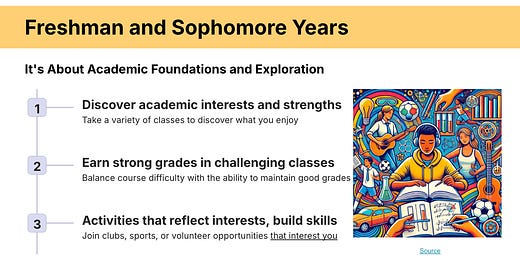What To Focus on Freshman & Sophomore Years of High School
Key strategies for building a strong foundation for college admissions during your first two years of high school.
If you’re wondering, “What should I be doing during high school to prepare for college?” you’re not alone.
Here’s a clear year-by-year guide to help you focus on what matters most.
Freshman and Sophomore Years: it’s about academic and activities foundations + exploration
Junior Year: it’s about college search, learning, prep
Senior Year: it’s about applying and deciding
In a series of consecutive posts, I’ll dive into each of these. Let’s kick off with unpacking Freshman and Sophomore Years.
Freshman and Sophomore Years
Students - use Freshman and Sophomore years to figure out what you like and what you are good at, earn the best grades you can, and participate in activities that reflect your interests and build skills (which is different from participating in an activity because you think it “looks good”).
Discover What You Love (and What You Don’t)
Think you might like studying business? Or participating in theater? Or debate? Or robotics? Or gardening? Or working a part-time job?
Now is the time to explore. For example, if you’re curious about science, take a robotics elective or join the environmental club. If you’re interested in business, sign up for an entrepreneurship workshop or a DECA chapter.
The truth is that a good deal of student’s schedules and classes are scripted in order to meet graduation requirements. English, History, Math, Science, and learning a new language are pretty much musts.
The standard high school schedule probably won’t give you lots of room to explore. Which is why you should make room to explore.
Say “no” to electives that are uninteresting to you and “yes” to those that are.
Pay close attention to how certain graduation requirements can be met, as it is often the case that certain types of credits (tech, phys ed, health, etc…) can be fulfilled in more than one way. Choose the way that you are most interested in, which may be a more circuitous path, and that’s OK.
Participate in clubs that you are drawn to.
How will you know if you have strong interests and/or strengths if you haven’t given them a try?
Many mistakenly believe that there will be time to explore later - in subsequent years. In reality the opposite is true. Freshman believe they are busy until they become Sophomores. Sophomores believe they are busy until they become Juniors. And so on. Explore early.
Why Good Grades Matter—and How to Balance Challenges
I say this a lot - because it is very important. The #1 factor in admission decisions is your grades in high school. Your grades show colleges how you’ve prepared, academically, for college.
Therefore, my opinion is that you should balance course difficulty with your ability to maintain good grades.
And know that no “bad” grade is going to exclude you from your college opportunities. It is almost never one thing that makes a difference, but rather a combination of complex factors.
Colleges understand that Freshman are barely into their teen years, and still figuring things out. In fact, some college applications even exclude Freshman year grades (see: University of California system).
Avoid overloading your schedule with advanced classes if it compromises your ability to succeed or stay healthy.
Don’t pressure yourself by trying to meet what you think is someone else’s academic standard. Instead, set your own measure for yourself and do your best. That is all you can do.
Activities: Quality Over Quantity
Join clubs, sports, or volunteer opportunities that interest you.
You are not trying to participate just to have something to talk about on your application. Instead, look at extracurriculars as a way to discover who you are as a whole person, outside of the classroom, and to cultivate skills that will serve you well in whatever path you choose.
There is no set number. More is not better. Less is not better (or worse).
Rather than quantity, focus on quality. And to you, quality means not what others think (or what you think others, like admissions officers, will think) but the genuine interest and willingness to dedicate your important time to the opportunity.
Instead of trying to join five clubs you don’t care about, focus on one or two that truly spark your interest. Commit to these over time, and consider taking on leadership roles or special projects.
Most activities will help you develop more than just the obvious main skill. Take this into consideration.
Team sports can develop you as an athlete - yes - but also help you develop leadership, communication, collaboration, and resilience.
Volunteering can help you develop empathy, justice, and awareness of global issues.
Holding a part-time job can help you develop accountability, responsibility, and time management.
When you pursue activities that you are truly passionate about, it shows:
In your continued commitment: it’s tough to keep doing a thing for all four years of high school if you don’t like it
In the way in which you engage: more likely to choose to lead others, choose to contribute more time and energy
In the pride you take: in describing your impact and what you’ve learned to others (something you will do in most college admissions applications)
Don’t choose activities just because they ‘look good’ to colleges. Admissions officers value authenticity over padding your resume.
What’s Next
High school is your chance to grow, explore, and prepare—not just for college, but for life. Use Freshman and Sophomore years to start discovering what interests you, balancing academics with activities you love, and focusing on what feels right for you.
In the next post, we’ll tackle Junior Year—the year of college searches, preparation, and planning. For now, enjoy the process and remember: this journey is about finding your best path.




